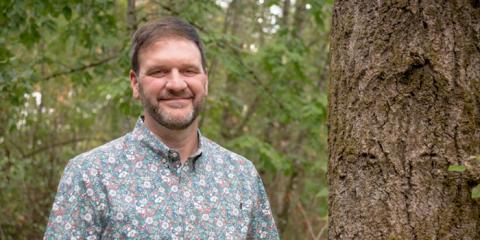OFRI's unique purpose of advancing common interests between forestry, all Oregonians
September 27, 2022
I’m Jim Paul, the new executive director of the Oregon Forest Resources Institute (OFRI). Established by the Oregon Legislature over three decades ago, OFRI’s fundamental mandate is to support Oregon’s forest products sector and foster the wise stewardship of natural resources for the benefit of Oregonians. With almost half of Oregon covered in forestland, this is a critical sector that can directly touch nearly every Oregonian.
At the time OFRI was founded in 1991, Oregon recognized that forestry encompasses one of the largest economic sectors in the state. Today it contributes an estimated 61,500 jobs to Oregon’s economy, more than $8 billion in state gross domestic product (GDP) and more than $18 billion in base economic output. This equates to almost 3% of total state employment, 3.7% of state GDP and 4.7% of total state output – that’s nearly $1 of every $20 generated in Oregon. There are also more than 62,000 Oregonians who own more than 10 acres of forestland, and that number roughly doubles when you include owners of smaller forestlands.
Notwithstanding all of these important economic and social factors, this vital sector depends on responsible stewardship of the nearly 30 million acres of forestland in Oregon. Forest stewardship is a topic that has seen a lot of attention and vigorous public debate in recent decades in the face of some turbulent times for forestry in Oregon. At the core of this debate is a familiar concept that can be expressed in a single word: sustainability.
When we talk about the sustainability of our forests, what does that mean? For me, it means ensuring that environmental values such as clean water and air, wildlife habitat and carbon storage – to name just a few – are protected to meet the public’s expectations now and into the future. It means our forests are providing the recreational opportunities and open space Oregonians value so much. And that our forests are producing the wood and paper products that Oregonians enjoy and count on in their daily lives.
Sustainability also includes recognizing the interdependence of these values – a three-legged stool supported by the environmental, social and economic benefits our forests provide. If Oregon is going to remain successful in sustaining healthy and vigorous forests, we need to strive to meet all the expectations and needs Oregonians have when it comes to our forests.
To achieve sustainability requires collaboration across many different interests statewide, and a common understanding of the fundamental facts about our forests. It also requires open and honest public engagement, with easy access to information so a healthy public debate can occur – one that values and considers diverse perspectives. This is essential to ensuring the public policy decisions made by our natural resource leaders are ultimately in the best interests of all Oregonians, and the sustainability of all our forestlands.
OFRI is in a unique position to provide leadership through forest education, with a dual mandate of supporting what’s in the best interest of both the public and the forestry sector in Oregon. A purpose that does not put one interest over the other, but instead leans into that sweet spot where benefits can be realized for all. A real-time example of this is the education and outreach OFRI has provided regarding the Private Forest Accord, a collaborative agreement between the forest industry and conservation groups that charts a new path forward in determining the future of many of Oregon’s private forest practices regulations.
No other organization in Oregon is positioned as OFRI is: charged with a singular focus on advancing the common interests between the forestry sector and Oregonians. And as a state entity, OFRI is directed and entrusted to carry out its work from a professional, balanced and nonpartisan perspective. These principles, centered on finding common ground in resolving challenging natural resource issues, are ones I’ve carried with me throughout much of my public service career in forestry and land management, and I’ll continue with them as the executive director of OFRI. I look forward to advancing OFRI in the essential leadership role it has been tasked with to keep this state’s forest sector strong, and to work hard to ensure the wise stewardship of Oregon’s forests for generations to come.
Jim Paul
Executive Director
